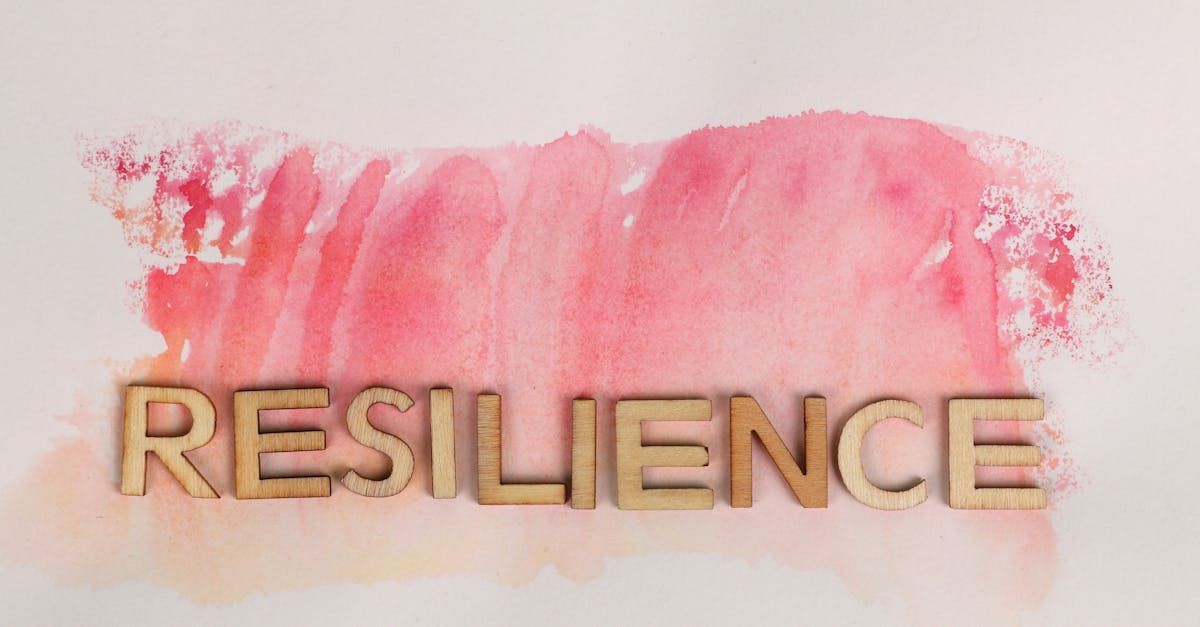On resilience and how to cultivate it
I thought I was resilient...

Until my doctor told me I either needed to be operated for my bad knee, or take a 3-month rest from climbing.
What you might not know about me, is that to make sure my life is balanced, I do bouldering when I'm not with my clients in therapy sessions or studying. I started bouldering when I was 18 and it gave me so many things that I recommend this sport to literally everyone that is interested in bringing in more exercise, mindfulness and fun in their life. Alongside the very obvious healthy things, it gave me friendships, it gave me confidence, and it gave me a hobby that I truly cherish. My life pretty much consisted of work and bouldering, and I was very content with the way things were, so naturally, no matter how much self-regulation techniques I know, when the doctor uttered those words- ''no climbing''- I felt taken aback, and quite furious. What was I going to do now to feel balanced, how was I going to de-stress, what about my already paid membership, and how about meeting my friends ? Was I going to lose all my skill and power that I have achieved with so much hard work? There were many questions and remarks in my head. I realized my reaction was exaggerated, after all I am free to go back to it in just 3 months; still, I couldn't shake the feeling off. I left his office frustrated, and a bit lost.
So how is all this related to resilience?
Well, resilience is the ability to bounce back or recover from difficult or challenging situations (from Latin verb ''resilire'', or, “to leap back”). It is the capacity to adapt and thrive in the face of adversity, stress, trauma, or significant life changes. For me, not being able to do what I so much like for 3 months felt like I lost something, like a part of my identity was, if not stolen, put on hold. And that's quite difficult. I had always thought I was resilient because it is something I have been cultivating for very long, but this took me by surprise and made me wonder....am I truly resilient, and how can I use this opportunity to exercise my resilience?
And I had to write about it, because it is such an important topic when considering it can have quite an impact on mental health (1).
Why does resilience matter and why should you think about ways to cultivate it?
- Resilience helps you cope with stress, adversity, and trauma in a healthy way, reducing the likelihood of developing mental health issues such as anxiety, depression, and post-traumatic stress disorder.
- Resilience promotes positive coping strategies by making you better equipped to deal with challenges and setbacks, leading to lower levels of psychological distress and better emotional regulation.
- Resilience fosters adaptive behaviors: people with high levels of resilience are more likely to engage in positive behaviors such as seeking social support, problem-solving effectively, and maintaining a positive outlook, all of which contribute to better mental health (2)
- Resilience enhances psychological well-being: Research suggests that individuals with greater resilience tend to experience higher levels of life satisfaction, self-esteem, and overall psychological well-being. (3)
How can you cultivate it when something bad happens or, even better, in advance?
My first thought when I realized that I seriously needed to stop climbing or else I'd have to face an operation was ''I should be able to control my emotions now, and stop being so frustrated''. Luckily, I realized very fast that that was negative self-talk and it was not going to help me be more resilient. In fact, it would have done exactly the opposite. So I gave myself permission to be very frustrated, angry and sad (see stages of grief :) ) for as long as I needed to be able to reach the stage where I could genuinely say and feel ''what can I do about it?''.
So...
- Learn to feel your feelings and not to push them away. Feelings are information and not allowing yourself to feel them almost always ends up in a big pile of stuff that at some point will explode, not to mention that you lose the opportunity of learning what you actually need.
- Build strong relationships: maintaining supportive relationships with friends, family, or a community can provide emotional support and a sense of belonging, which are important factors in developing and maintaining resilience. My friend immediately helped me build a training plan that involves no climbing, and rest assured that everyone from the gym knows ''I cannot climb for 3 months''.
- Enhance your ability to tackle challenges by improving your problem-solving skills. Break down problems into smaller steps, brainstorm solutions, and take action to address issues effectively.
- Prioritize self-care activities such as exercise, healthy eating, getting enough sleep, and engaging in activities that bring you joy and relaxation. Taking care of your physical and emotional well-being can help build resilience.
- Focus on developing a positive attitude and optimistic outlook. Practice gratitude, mindfulness, and positive self-talk to help shift your perspective and maintain a hopeful attitude during difficult times.
- Set realistic goals: break down your goals into manageable steps and work towards achieving them gradually. Setting realistic goals can help you build confidence, stay motivated, and navigate challenges more effectively.
- View failures and setbacks as opportunities for growth and learning. Reflect on past experiences, identify what you have learned, and use that knowledge to adapt and improve in the future.
- Don't hesitate to seek help from mental health professionals, counselors, or support groups if you are struggling with stress, anxiety, or other mental health challenges. Talking to a professional can provide you with valuable tools and strategies for building resilience.
Everyone goes through some degree of adversity at some point in their life, and it's worth being prepared so that you tackle those events coming out okay and perhaps stronger.
As for me...I'll keep training my upper body.
(1) Hu, T., Zhang, D. and Wang, J. (2015) ‘A meta-analysis of the Trait Resilience and Mental Health’, Personality and Individual Differences, 76, pp. 18–27. doi:10.1016/j.paid.2014.11.039.
(2) Buikstra, E., Ross, H., King, C. A., Baker, P. G., Hegney, D., McLachlan, K., & Rogers Clark, C. (2010). The components of resilience—Perceptions of an Australian rural community. Journal of Community Psychology, 38(8), 975–991. doi:10.1002/jcop.20409
(3) Tugade, M. M., Fredrickson, B. L., & Barrett, L. F. (2004). Psychological resilience and positive emotional granularity: Examining the benefits of positive emotions on coping and health. Journal of Personality, 72, 1161–1190. doi:10.1111/j.1467 6494.2004.00294.x
Mehta, M. H., Grover, R. L., DiDonato, T. E., & Kirkhart, M. W. (2019). Examining the Positive Cognitive Triad: A Link Between Resilience and Well-Being. Psychological Reports, 122(3), 776-788. https://doi.org/10.1177/0033294118773722





